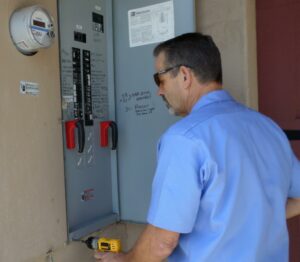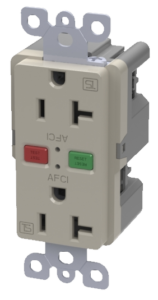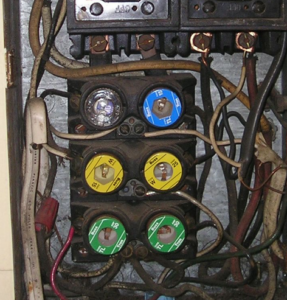Although most people take electricity and electrical systems in rental properties for granted it is important to understand the basics of these items and operations. We open our garages with automatic openers, we flip on the light switch, we click the television remote, and we expect our food and drinks to be cold each and every time we open the refrigerator. All of these things we expect to be functioning each time we ask for it, but what is behind the scenes is important to understand.
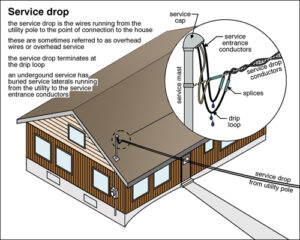 Basic Electric Supply to Rental Homes
Basic Electric Supply to Rental Homes
The local utility provides the main electrical supply to the house either with overhead or underground service entrance conductors which terminate in a main electrical panel on the exterior of the building. From there, branch circuits carry electricity to other parts of the building to receptacle outlets, light outlets, switches, appliances, and other sub-panels. Circuit breakers within the panels control safety of the current running on the branch circuits. More in-depth analysis of branch circuits show the differing types of interior branch circuits.
Arc Fault Circuit Interrupters or AFCIs are the most recent requirements for residential units but most renters are unaware of their existence. Ground Fault Circuit Interrupters or GFCIs are some of the more common components within a rental unit as they have been around for several decades now (white receptacles with red and black buttons are the most common).
Typically, renters think of electrical conditions and concerns as issues that property managers and landlords have to deal with but it’s important that tenants become familiar with these items to improve the overall safety of their tenancy.
What is the Difference between AFCIs and GFCIs?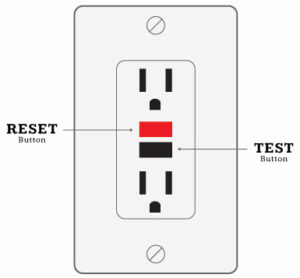
AFCI breakers are somewhat newer, and less likely to be found in older homes and apartments – unless there has been recent remodeling or upgrades performed. AFCIs are designed to shut off power when arcing is detected in the circuit. Arcing is when current jumps or escapes between two items in the structure of the conductors that either should be connected, or between which power should not be moving at all (either of these are called arcing). For example, if one of the wires on the back of a switch or receptacle outlet were loose and caused a spark inside the wall, a properly functioning AFCI would shut off power to that outlet to help prevent fire danger. This also keeps you safe if insulation on an old wire has begun to wear away and is allowing current out where it shouldn’t. Like a GFCI, an AFCI type protection device can be found at the breaker or at the switch or receptacle outlet.
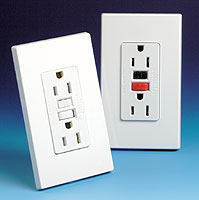
A GFCI, or Ground Fault Circuit interrupter, is a breaker that detects and monitors the current of a circuit – it monitors the current going out on the circuit and compares it with the current returning. If there is a discrepancy the GFCI shuts the circuit down. A GCFI or GFI can either be in the electrical panel box (less common in older installations) or it can be on the receptacle outlet itself (red and black buttons are common). The typical GFCI is on the outlet itself is the type you’re likely most familiar with. The two buttons each have separate functions, one to test and one to reset. This keeps humans safe by cutting off power if it detects that the current is grounding itself to anywhere other than the ground wire, such as you. GFCIs are required and installed in wet areas and other high risk areas to prevent unsafe conditions like kitchens, bathrooms, exteriors, basements, and garages.
AFCI vs. GFCI – Why Landlords, Property Managers, and Tenants Need To Care?
Importantly, tenants should understand the difference between AFCI vs. GFCI because they trip for different reasons and differing safety conditions. Generally speaking, a properly installed GFCI tripping can be several reasons – standing in a puddle of water might allow a small current to flow through you, and even that is enough to trip a GFCI in the right circumstances; a sudden jolt of electricity from a surge by the power supplier; or even some mechanical event at or near the protected circuit.
AFCI events are less often user error and more often something that an electrician needs to be called to resolve. While it’s possible to trip one by pulling a plug out of a socket incorrectly, that’s somewhat less common. Usually it’s a sign of an underlying condition in the wiring of the home that needs to be addressed by a competent licensed electrical contractor.
Smoke alarms are designed to alert you to a fire. Fire extinguishers are designed to help you put out a small fire, if it’s safe to do so. AFCI receptacles and breakers are designed to prevent fires. Where present, they can stop small electrical arcs from becoming large ones that can start a fire inside a wall, unbeknownst to you.
10 Electr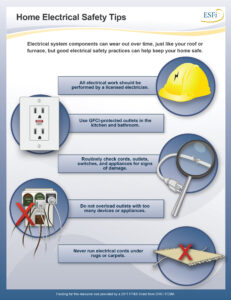 ical Safety Tips for Rental Properties
ical Safety Tips for Rental Properties
It is important to review your rental home electrical safety practices on a regular basis. National Electrical Safety Month (May) is a good time to review your rental property and workplace electrical safety practices. Here are some practical tips, provided the National Fire Protection Association, (NFPA) to help protect your tenants and your rental properties from an electrical fire:
- Monitor electrical cords to make sure they’re not running across doorways or under carpets – Replace damaged cords immediately
- Extension cords are only intended for temporary use – have a competent, qualified licensed electrician add more receptacle outlets to minimize the use of extension cords
- Use appropriate wattage light bulbs that match the recommended rating on the lamp or fixture
- If receptacle or switch outlets feel warm to the touch, or have constant problems with blowing fuses or tripping circuits, or flickering/dimming lights, call a competent, qualified licensed electrician
- Only plug one heat-producing appliance (such as a coffee maker, toaster, space heater, etc.) into a receptacle outlet at a time
- Do not use electrical appliances close to water sources such as sinks, pools and bathtubs
- Arc fault circuit interrupters (AFCIs) are a type of circuit breaker that shuts off electricity when a dangerous condition occurs and should be considered for all older homes
- Use ground fault circuit interrupters (GFCIs) to reduce the risk of shock and should be installed inside the home in bathrooms, laundry rooms, kitchens, garages, exteriors and basements
- Test AFCIs and GFCIs monthly
- Keep the area around your electric meter and other electrical equipment clear.
- Have all electrical work done by a competent qualified licensed electrical contractor
- The NFPA recommends hiring a professional tree cutting service to trim branches that might fall on overhead electric wiring
Unsafe Electrical Panels
If your property still has one of the following type electrical panels you should immediately contact a competent qualified licensed electrical contractor to remove and replace it to prevent potential liability, property damage or injury. These panels are all old, unsafe, and are all susceptible to fires.
Federal Pacific Panels
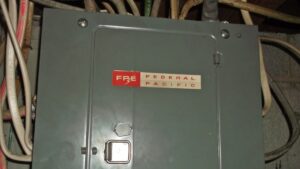
Zinsco Panels
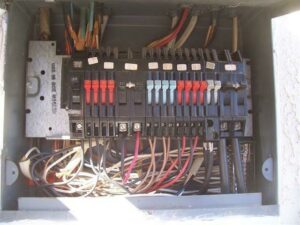
Fuse Boxes
Conclusion
Although most landlords and property managers take electricity and electrical systems in rental properties for granted it is important to change habits. Having an inspection by a competent licensed electrician can prevent a catastrophe, a fire and personal injuries. At Esquire Property Management Group we call on Bay Valley Electric to handle the electrical issues and maintenance concerns for our client’s properties. Bay Valley Electric has been in business in Silicon Valley for over 25 years and provide prompt, professional service. Don’t hesitate to reach out today and give yourself, your tenants, and your clients peace of mind.
David currently is the broker/owner of several real estate related businesses which manage and maintain 300+ client properties on the San Francisco Peninsula.
Trust, transparency, and performance guarantees are the foundation of these businesses. David challenges anyone to find a PM professional that offers services similar - extensive education, customer service, and performance guarantees.
David also provides consulting for his clients on property development feasibility, construction, and complex real estate transactions.
David has authored a published law review article, three real estate books, and over 150+ real estate blog articles.
- “Wildfires, Insurance & Mortgages: Will Your Home Survive the Financial Aftermath?” - March 3, 2025
- What’s Driving California’s Commercial Real Estate Shakeup? - February 27, 2025
- Critical Issues in Triple Net Leases Investors Should Know - February 14, 2025

